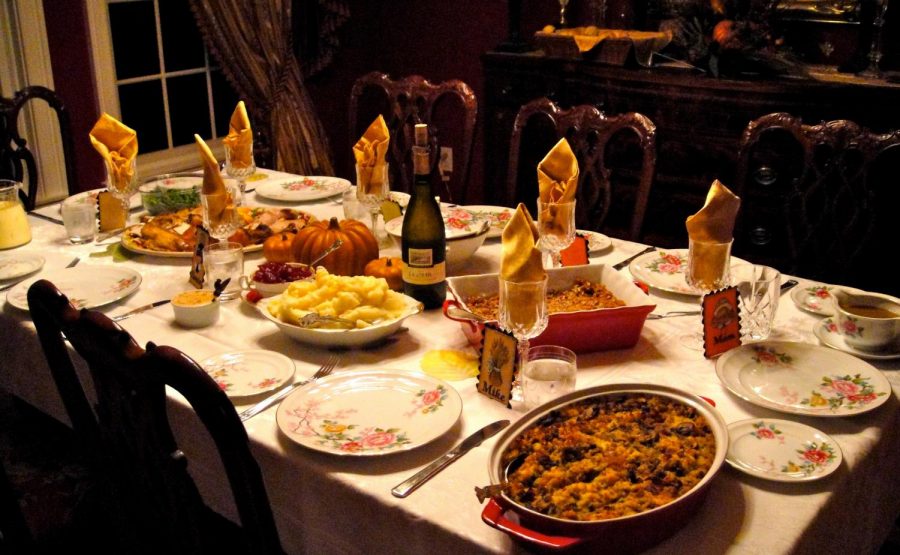Big Blue Plymouth: An Alien Take on an American Classic
November 14, 2018
Most people on Earth probably see the existence of Thanksgiving as a foreign or alien concept (literally and figuratively); however, most Americans see this holiday as iconic and familiar as Richard Petty’s Blue Plymouth Superbird. Growing up in Mexico City, I only learned about Thanksgiving’s existence at the age of 10. My friends who attended the American School in Mexico all got a week off from school towards the end of November. All the while, I sternly sat in a classroom teeming with jealousy. That alone might explain my transfer to the American School two years later.
At school in Mexico, I learned about Thanksgiving in American History class. I was taught how Pilgrims in Plymouth, Mass. were welcomed by Native Americans who received them with a feast and taught them how to harvest a land that was alien to them. Soon after, I was taught about American expansionism, the concept of “manifest destiny,” and how these national ideals wrought pain into so many people’s lives. I was shown videos of men crying over their loss of identity on Sioux reservations in South Dakota. I had to write research papers on the Wounded Knee Massacre. Through those assignments, I learned that some Americans choose not to celebrate the holiday because they see it as a celebration of the eradication of this country’s Native tribes.
Perhaps the manner in which these subjects were introduced to me was heavily influenced by a Mexican system of education that aimed to villainize the colonialism of the Spaniards and the eradication of Mesoamerican cultures. Consequently, most of us saw the observation of Thanksgiving as a sort of cruel joke. Browsing the internet, we frequently stumbled upon memes about Canadian Thanksgiving — a separate, but almost identical holiday celebrated on the third Monday of October. While speaking to adults, we constantly encountered jokes about American commercialization of holidays, especially ones regarding Thanksgiving. Yet most of us had never experienced a true, American Thanksgiving. I did not know it then, but my conception of Thanksgiving was about to change.
In 2010, I moved from Mexico City to the stereotypical American suburb of Westchester, N.Y. While adapting to American culture was not easy for me, it must have been significantly more difficult for my parents. After all, they had spent over 40 years imbued in a radically different milieu than that of suburban America. Notwithstanding, after three and a half months, my parents seemed to be settling well to life and society in suburbia. My mother had made a lot of friends, and in an attempt to grow closer to them, she decided to host Thanksgiving dinner at our house.
The biggest problem that my mother faced revolved around a simple question: “How do you host Thanksgiving dinner if you have never experienced a Thanksgiving dinner?” My mother chose to respond to the question by bringing her own identity into the meal. We had a de facto Mexican Thanksgiving dinner. Where there was turkey, there was also turkey enchiladas. Instead of having traditional sweet corn, we had choclo. The sweet mashed potatoes were there too, but all with a taste of Mexico. Our guests were fascinated by the meal and the ways in which my family made them feel at home. As the adage says: “Mi casa es su casa” — my house is your home. And for the next eight years, that remained constant. We hosted Thanksgiving every year, and the same people who were there on that very first dinner, were there on the last (now as part of our family).
Upon approaching my mother when I began writing this article, I asked her how hosting Thanksgiving helped her assimilate to American culture. And she replied with something rather unexpected: “To be quite honest, I have never seen myself as someone who assimilated to American culture. Every time I hosted Thanksgiving dinner, I felt as if I were sharing a piece of myself with all of our guests. If I had to place myself in the folklore of Thanksgiving, I believe I would relate the most to the Native Americans. I never hosted Thanksgiving to get anything in return. I only hosted to give. Every year people spoke about how picturesque and amusing my Thanksgiving dinner was, and I just wanted to share that with people.” Instead of feeling like an alien or a foreigner, my mother felt at home. And what I find most virtuous about her thoughts on the holiday, is the fact that she selflessly wanted to share her cultural identity.
We currently live in a time of great disagreement. It is difficult to walk about campus without hearing talk of politics and the differences between us. We have all welcomed a rhetoric of “us versus them,” whether for ill or for good. And now, so soon after a season of contentious midterm elections, we ask ourselves more than ever: “What are our civic duties as Americans?” Regardless of how you might even begin to approach answering that question, regardless of how you celebrate Thanksgiving, please keep your doors open and make all your guests feel welcome and at home.












